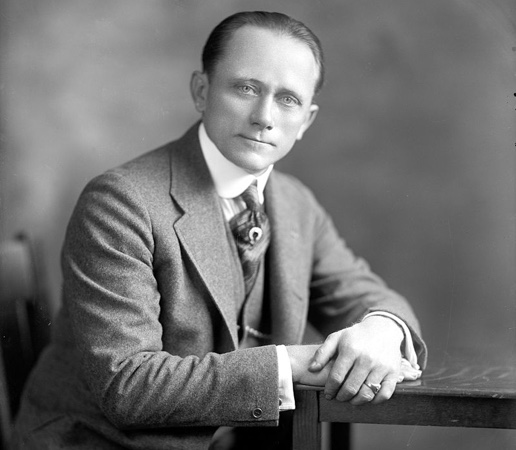The Wrong Lesson Trump Learned from History

Theodore Bilbo
Brigadier General John Pershing lined up fifty prisoners as if they were dominoes while he encouraged his soldiers to dip their bullets in pig’s blood. In an instant, his command rang out and forty-nine of the dominoes fell. One prisoner remained, whom Pershing ordered, “go back to your people and tell them what happened.” Based on this completely fictitious atrocity, Donald Trump declared to a South Carolina crowd last Friday, “there wasn’t a problem [in the Philippines] for 25 years. We better start getting tough and we better start getting vigilant, and we better start using our heads or we’re not gonna have a country, folks.”
For the bulk of the 2016 presidential contest, Donald Trump has used a particular brand of political rhetoric, one that incorporates implicit as well as explicit appeals to white Americans’ fears and hatreds about foreign and domestic people of color. Despite its novel feel, the story of a politician pulling on the darkest heartstrings of American racism and xenophobia is not new. Speeches filled with veiled threats and shrouded racism have long been a facet of America’s political system. A quick glance at Mississippi history offers a window into the dangers that Trump’s violent rhetoric holds for the future of American political discourse.
In the summer of 1946, a short, angry politician from Mississippi decided to capitalize on the fears surrounding the Supreme Court’s decision to outlaw whites-only Democratic primaries in Smith v. Allwright. He ran for election to the United States Senate on a platform built entirely on racism. “I tell you we are living on a Volcano,” Theodore Bilbo told a Jackson audience, “that may erupt at any hour.” He exclaimed that “Anyone ... who coddles, encourages, or otherwise intends to influence the Negro to vote in a white primary, should be horse-whipped, tar and feathered, and chased out of the state.” Moreover, Bilbo continued, the leaders of the Mississippi Progressive Voter’s League, an African American civil rights organization, should be “atomically bombed and exterminated from the face of the Earth.”
Throughout his campaign, Bilbo exhorted his crowds to use “any means necessary,” to keep those who opposed “traditional white American values” from voting. Violence engulfed the state on Election Day. Reports from across Mississippi described beatings, intimidation with deadly weapons, and even one whipping with a wire cable. The tidal wave of violence, however, was only beginning to crest. Throughout the summer of 1946, blacks became the victims of cross burnings, beatings, and economic intimidation by whites who feared black social and political equality. The Philadelphia Afro-American reported, “A wave of racial antagonism and violence following fast on the heels of Bilbo’s pre-election hate campaign is spreading throughout Mississippi.” Bilbo won the election by a large majority. Despite heartbreaking testimony from sixty African Americans who stated that Bilbo’s speech had created a climate of fear and intimidation throughout the state, a Senate Investigating Committee filled with Bilbo’s friends found that he did not commit election fraud because his speech did not substantially intimidate voters.
Bilbo’s victory signaled to both national and international communities that appeals to violence and hate speech were acceptable in United States elections. Variations of his appeals to racism would be used by later generations of politicians including Strom Thurmond, George Wallace, and Ross Barnett to incite fear and hatred in order to win office.
The casual acknowledgement that Bilbo-esque language is acceptable from a potential national leader has already begun to foster a climate of fear and hatred on a grander scale than Bilbo’s rhetoric. This past August, only two months after Trump announced his candidacy, two brothers beat up a homeless Latino man in Boston and cited Trump as being “right ... all these illegals need to be deported.” In Birmingham, Miami, and Charleston, peaceful protesters have been beaten and dragged out of venues by Trump supporters. Trump’s reaction to this violence is acceptance and laudation. At his rally in Charleston, he brought two of the adults who attacked a high school aged protester on stage and thanked them for their courage, and when referring to another protestor at a rally in Las Vegas Trump told the crowd that he would like to “punch him in the face.” By invoking violent rhetoric in his speeches, Trump sends the message that free speech is only for some and that violence can and should be used to suppress others.
Like Bilbo, Trump’s words possess the power to become very real sticks and stones. A responsible society would deplore the comments of Trump, not dismiss them as a farce, and would certainly not applaud them as “telling it like it is.”